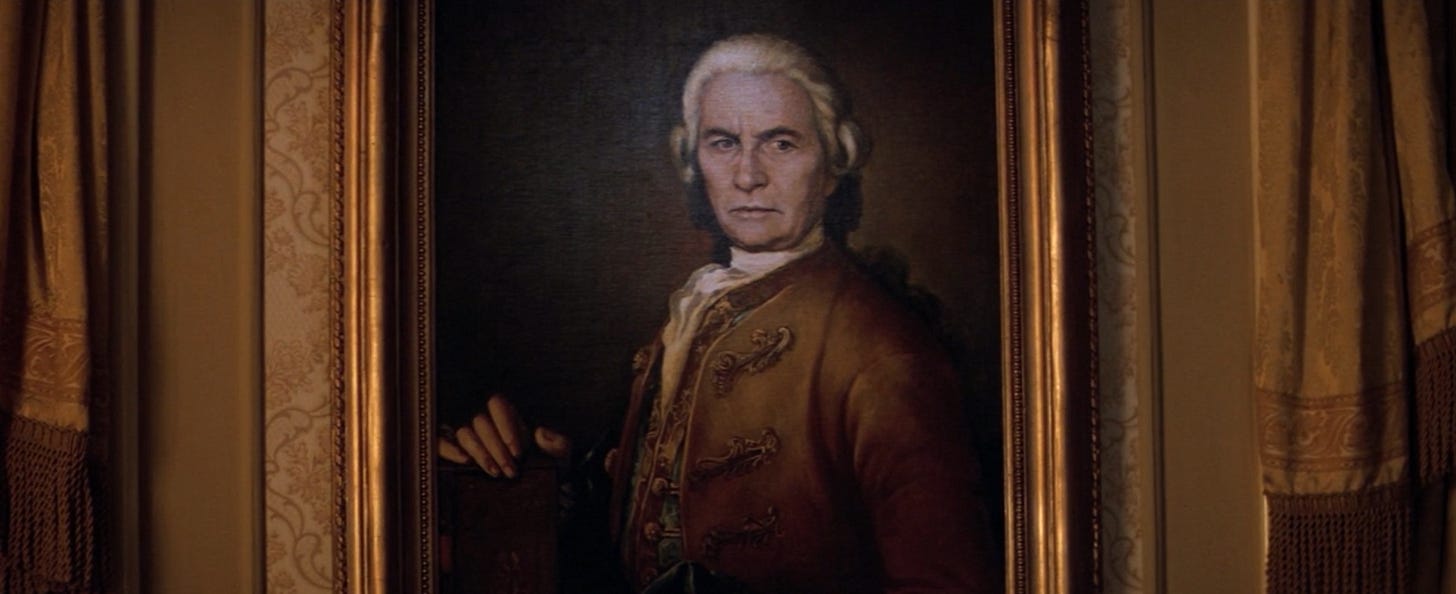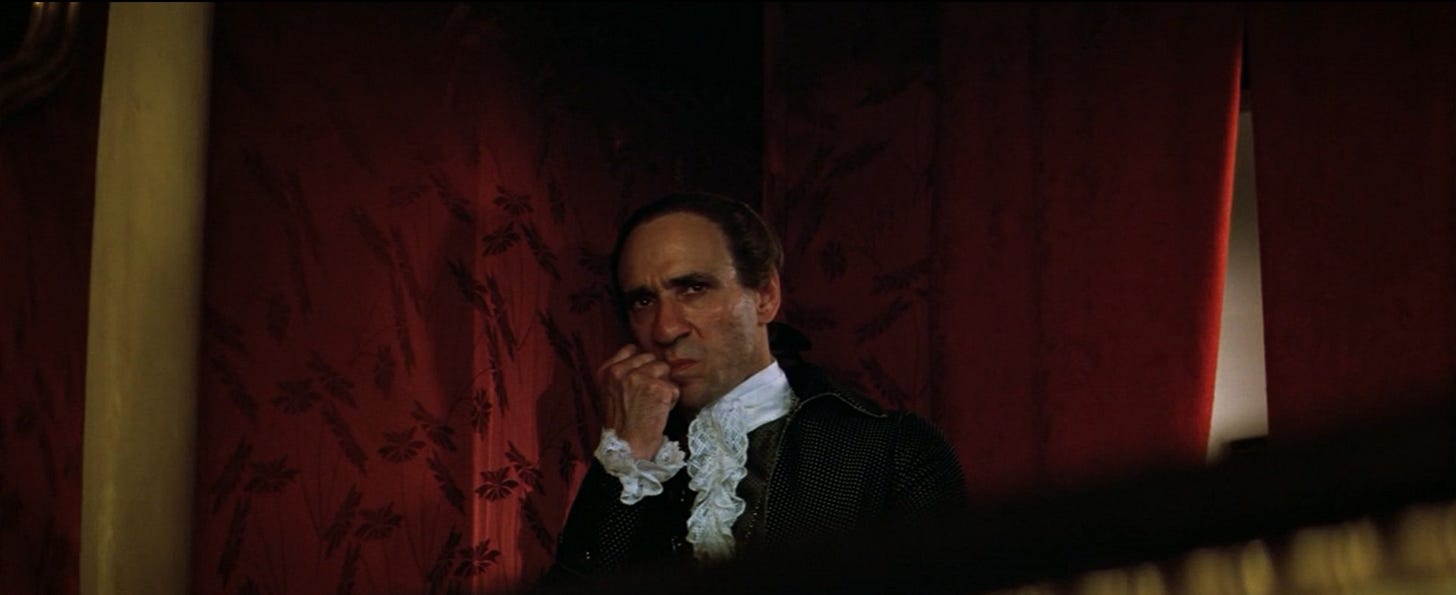Film Scenes that Stayed With Me: Amadeus
A scene analysis
Here is an extract from a film that had a profound impact on me in my early twenties: Amadeus. From the, in my opinion, underrated director Milos Forman and of course originally from the play by Peter Shaffer.
In this scene, Salieri, who has done everything he could to sabotage Mozart, explains his own central conflict: namely, that his pride pushes him to destroy Mozart, while his heart is in love with his music.
This conflict has always fascinated me. It led to some people calling this phenomenon ‘Salierism’. When someone just has enough talent to see true genius, but not enough to produce it himself—and suffers for this reason.
I’ve always thought this was such a subtle and powerfully human thing to explore, and I think the film really does it justice. In truth, I have never seen the play staged, so I can’t quite compare the film and the play. But the film has certainly got me to think a lot about human nature.
But let’s look at the scene itself.
Analysis
It all starts after Mozart learns about his father’s death. Then Don Giovanni blasts, and we cut to this stern portrait of Mozart’s father. He is dead centre, boxed by the frame itself but also by the curtain. He almost looks like he is in a corridor somehow…
Very interestingly, the camera is handheld for this shot, reinforcing the sensation of watching from somebody’s POV. As if we were Mozart himself, writing Don Giovanni while staring at the painting.
Then we get this straight shot of the stage with all the performers. Notice how Mozart is present and gesticulating. This cleverly reinforces our connection with Mozart himself, it’s as if this shot was what he experiences during this concert, how he sees it.
After this we discover old Salieri, who is the voice-over throughout the entire film. Salieri is the real protagonist of the movie; he is the one through whom we discover Mozart most of the time. I love the little pale candles reflection in the generally bleak room around him. It almost feels like it is yearning itself, a struggling light in the darkness…
After a few more shots back and forth, and while Salieri makes the link between Don Giovanni and Mozart’s father, we have this shot: a classic low-angle, slightly dutch (tilted) composition of the fearful creature. Of course, this emphasizes its power over Mozart.
Once again, it feels like Mozart’s POV. Salieri is explaining to us what Mozart experiences, how he sees things.
We then see Mozart properly for the first time. This is an interesting shot. It’s taken with a very wide lens, and Mozart is again dead centre in a symmetrical composition.
The perspective almost gives this a slightly head-spinning feel; it looks like the room itself is bending. The chandeliers reinforce the sensation of Mozart being touched by grace, as if there were angels in the sky for him. The room is not packed, Salieri has already sabotaged Mozart who is not experiencing success anymore.
For the rest of the scene, we will often cut back to this shot and contrast it with Salieri’s.
This is the first time we see Salieri in the ‘now’ of the scene. In contrast to Mozart, Salieri is shot with a long lens that compresses the perspective. He looks imprisoned in this coffin-like lodge, alone, suffering.
To me, it really looks like Mozart is in paradise playing with angels, while Salieri observes him from hell. Notice the one single candle here, specifically placed in the bright opening of the curtain. It’s as if it is Salieri’s hope, almost gone already.
Now we see the stage again but at an angle, from inside the lodge, Salieri’s straight-up POV. The scene, therefore, starts splitting the POV between Salieri and Mozart.
For a while, things build up between the shots that we’ve seen. The music is going crescendo and we switch back and forth between the POVs of the two characters. They are seemingly the only two in the entire theatre to experience the music that profoundly.
Salieri explains his madness to the interviewer while the pace picks up.
The shots on stage almost feel like we are part of the cast. They show us how both protagonists experience the opera, fully absorbed in the story. It’s interesting how the dramaturgy is so strong at this point, that the simplicity of the directing doesn’t distract from the scene, but rather reinforces it.
The film is exploring man’s yearning for genius, and yet it doesn’t try to blow everyone away with some intense camera work or some clever ideas. Those are simple, well-composed shots that go straight to the gut rather than the brain.
During this sequence, Salieri literally states his desire to triumph over God, over his own mediocrity.
There is then a chaotic build-up with the music, the pacing of the edit really picks up, and that is reinforced by all the movements of the performers on stage.
I find it so striking how the shots from Mozart’s POV are always symmetrical and dead centre. It gives him a lot of power, making him truly otherworldly.
In contrast, we cut back to Salieri, bitterly jealous in his visual coffin. We are tighter, more uncomfortable, even his speck of light has disappeared and all that remains is his tormented soul.
Yet, despite everything, Mozart only receives lukewarm applause from the audience—something he owes to Salieri…
I really like this movie; it always struck me as wonderfully deep and well-executed. It also introduced me to classical music, which is a big part of me now.
This scene, in particular, encapsulates the profound emotional and psychological depth that Amadeus explores so well. The interplay between Salieri’s envy and admiration for Mozart’s genius is a powerful depiction of human complexity and vulnerability. Watching this film has not only given me a greater appreciation for classical music but also a deeper understanding of the human condition.
Whether you’re a long-time fan of the film or experiencing it for the first time, I hope my analysis has shed some light on its intricate beauty and inspired you to watch it with a fresh perspective.
Please don’t hesitate to point out some interesting film scenes in the comments—I’m always on the lookout for more cinematic gems to explore and discuss!















I often think about Amadeus because there is a huge spiritual lesson in Saliere's angst/envy/anger over Mozart surpassing him without any effort (seemingly). In one scene Saliere is talking to God, asking why give me the desire to make music without the talent for it? Here's the rub. Saliere didn't desire to make music simply for the joy of music. Art for art's sake, in other words. Unconditional art. Nope. Saliere wanted acclaim and status out of his musical compositions. He wanted to prove himself worthy by composing music that listeners hailed as great. Meanwhile, Mozart lives a "dissolute" life yet brilliant passionate music pours out of him onto the written page without error or rework. He just makes music unconditionally. It's too much for Saliere's limited self-love to comprehend.
Absolute masterpiece, thank you Remy. Another jewel from the 80's, in my opinion is S.Frears' "Dangerous Liasions", adaptation from the epistolary novel of Laclos. I read the novel after the film and I can say it is a complex, awesome work, in part thanks to Christopher Hampton's script, winner of an Oscar.